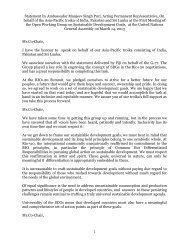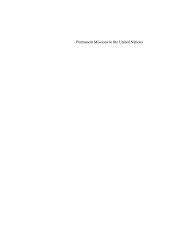Annual Session 2013 of the Executive Board of UNDP/UNFPA/UNOPS
Annual Session 2013 of the Executive Board of UNDP/UNFPA/UNOPS
Annual Session 2013 of the Executive Board of UNDP/UNFPA/UNOPS
You also want an ePaper? Increase the reach of your titles
YUMPU automatically turns print PDFs into web optimized ePapers that Google loves.
Statement by Ambassador Manjeev Singh Puri, Deputy Permanent<br />
Representative <strong>of</strong> India to UN, during <strong>UNDP</strong> Segment discussing<br />
Evaluation Reports on <strong>UNDP</strong> contribution to South South<br />
Cooperation and <strong>UNDP</strong>’s Evaluation <strong>of</strong> Strategic Plan 2008- <strong>2013</strong><br />
at <strong>the</strong> <strong>Annual</strong> <strong>Session</strong> <strong>2013</strong> <strong>of</strong> <strong>the</strong> <strong>Executive</strong> <strong>Board</strong> <strong>of</strong><br />
<strong>UNDP</strong>/<strong>UNFPA</strong>/<strong>UNOPS</strong> in New York on June 7, <strong>2013</strong><br />
Mr. President, I would like to complement <strong>the</strong> <strong>UNDP</strong> Evaluation Office for<br />
excellent reports on evaluation <strong>of</strong> <strong>UNDP</strong> contribution to South South<br />
Cooperation and on its Previous Strategic Plan, as contained in (DP/<strong>2013</strong>/17<br />
and DP/<strong>2013</strong>/31). These two evaluations are in particular, most welcome for<br />
<strong>the</strong>y could not be more timely and pertinent, as <strong>the</strong>y are coming right when we<br />
are working towards crafting <strong>the</strong> new Strategic Plan for <strong>UNDP</strong>. But before I<br />
begin, allow me to align myself with <strong>the</strong> statement delivered by Fiji, on behalf<br />
<strong>of</strong> <strong>the</strong> G-77.<br />
Mr. President, our intervention today in <strong>the</strong> Evaluation Section, perhaps flows<br />
from what Hugh White had said and I quote: “When you make a mistake, don't<br />
look back at it long. Take <strong>the</strong> reason <strong>of</strong> <strong>the</strong> thing into your mind and <strong>the</strong>n look<br />
forward. Mistakes are lessons <strong>of</strong> wisdom. The past cannot be changed. The<br />
future is yet in your hands, and your success lies in not repeating that same<br />
mistake again”<br />
To us <strong>the</strong>refore, Evaluations, are an excellent means <strong>of</strong> ‘course corrections’<br />
and a means to factor <strong>the</strong> lessons learnt, which need to be included in our<br />
plans for <strong>the</strong> future. The Evaluation Report on <strong>UNDP</strong>’s contribution to South<br />
South Cooperation has made some interesting observations:<br />
Course Correction One, Conclusion 4 states that ‘<strong>the</strong>re is no clear evidence <strong>of</strong><br />
<strong>the</strong> long term sustainability <strong>of</strong> South South initiatives supported by <strong>UNDP</strong>, and<br />
<strong>the</strong> wider replication <strong>of</strong> <strong>the</strong>ir benefits is uneven.’ It goes on to say “this is a<br />
clear area for improvement, where much attention needs to be paid to <strong>the</strong><br />
follow up effects <strong>of</strong> SS knowledge exchange initiatives, ei<strong>the</strong>r in direct<br />
implementation or in <strong>the</strong> policy arena’. We hope that this would be addressed<br />
in <strong>the</strong> Section on SS cooperation in <strong>the</strong> new draft Strategic Plan.<br />
Course Correction Two: Para 26- <strong>of</strong> <strong>the</strong> Report states “<strong>the</strong>re is a gap between<br />
how SSC is promoted and advocated for at higher levels <strong>of</strong> organization, and<br />
its practical and functional integration into programming.” It goes onto say in<br />
Para 29: “<strong>UNDP</strong>’s operational guidance and mechanisms to support SSC at<br />
regional and country levels were NOT in place” We hope that this would be<br />
addressed.”
Course Correction Three: Recommendation 5 – <strong>UNDP</strong> should clarify its<br />
FINANCIAL commitment with regard to its support to SSC. It explicitly calls<br />
upon <strong>the</strong> EB <strong>of</strong> <strong>UNDP</strong> to consider increasing its financial commitment to SSC.<br />
While <strong>the</strong> course corrections on SS enumerated in <strong>the</strong> Evaluation Report are<br />
many, I have chosen to focus on three most easily doable ones and hope that<br />
<strong>the</strong>se would merit attention <strong>of</strong> <strong>the</strong> <strong>UNDP</strong> SP team.<br />
I would now like to move to <strong>the</strong> Second but equally important Evaluation <strong>of</strong> <strong>the</strong><br />
Strategic Plan <strong>of</strong> 2008-<strong>2013</strong>.<br />
Recommendation 3 <strong>of</strong> <strong>the</strong> Report states “<strong>the</strong> new SP should emphasise <strong>the</strong><br />
priority <strong>of</strong> support at <strong>the</strong> country level, and explicitly recognize that no<br />
matter how good <strong>the</strong> work is at <strong>the</strong> centre, it is at <strong>the</strong> country level where <strong>the</strong><br />
difference is being made”<br />
Mr. President, to us this a very key recommendation that must find place in <strong>the</strong><br />
new strategic plan under consideration, for it is in improving <strong>the</strong> lives <strong>of</strong> people<br />
at <strong>the</strong> country level, where <strong>the</strong> development system must continue to focus on.<br />
Finding 6 <strong>of</strong> <strong>the</strong> Report states: “Programmes are seldom designed with<br />
sustainability in mind. The <strong>UNDP</strong> funding model also adds to <strong>the</strong> sustainability<br />
challenge.” It goes on to state” <strong>the</strong> likelihood <strong>of</strong> <strong>the</strong> sustainability <strong>of</strong> <strong>the</strong><br />
outcomes to which <strong>UNDP</strong> is contributing is poor”<br />
Mr. President, we have also seen examples from recent field visits <strong>of</strong> <strong>the</strong><br />
<strong>Executive</strong> <strong>Board</strong>s in Myanmar, where community level projects were abandoned<br />
midway because <strong>of</strong> lack <strong>of</strong> inbuilt sustainability in <strong>the</strong> projects, several needy<br />
lost jobs. We hope that as we go forward this critical aspect <strong>of</strong> ‘sustainability’,<br />
especially in community level projects would be factored.<br />
Mr. President, we firmly believe that course correction is always a welcome<br />
exercise and any endeavour, which is based on facts and rationale, that have a<br />
sound evidence base, in this regard, is never too late ! We had also made a<br />
similar intervention requesting <strong>UNDP</strong> to take into <strong>the</strong> findings <strong>of</strong> its own<br />
Evaluation Report on Poverty Reduction at <strong>the</strong> last <strong>Board</strong> in February. It had<br />
also made some extremely pertinent recommendations on tackling what has<br />
been termed as <strong>the</strong> "greatest global challenge" <strong>of</strong> poverty eradication in <strong>the</strong><br />
development debate.<br />
We hope that all <strong>the</strong>se would be taken onboard and would find<br />
reflection in <strong>the</strong> Strategic Plan for 2014 - 2017. I thank you Mr. President.<br />
Back to Table <strong>of</strong> Contents


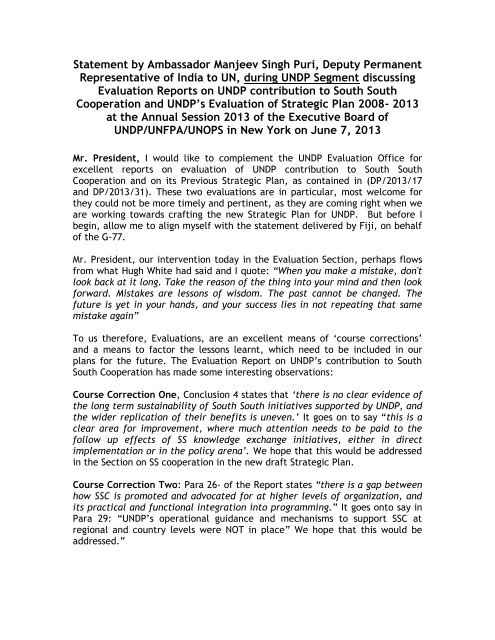
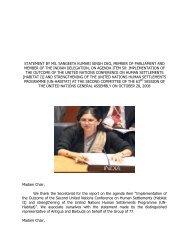
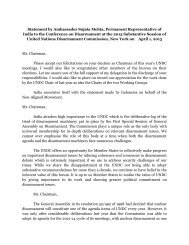
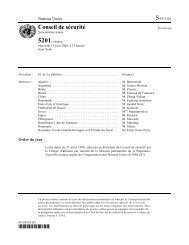
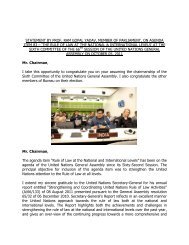
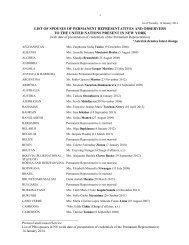
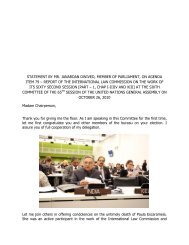
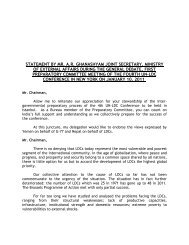
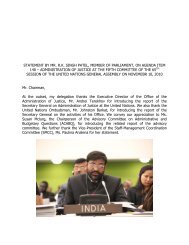
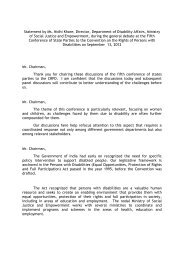
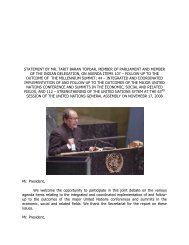
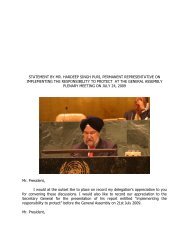
![1 statement by dr.[mrs] kakoli ghosh dastidar - Member States Portal](https://img.yumpu.com/27526598/1/190x245/1-statement-by-drmrs-kakoli-ghosh-dastidar-member-states-portal.jpg?quality=85)
